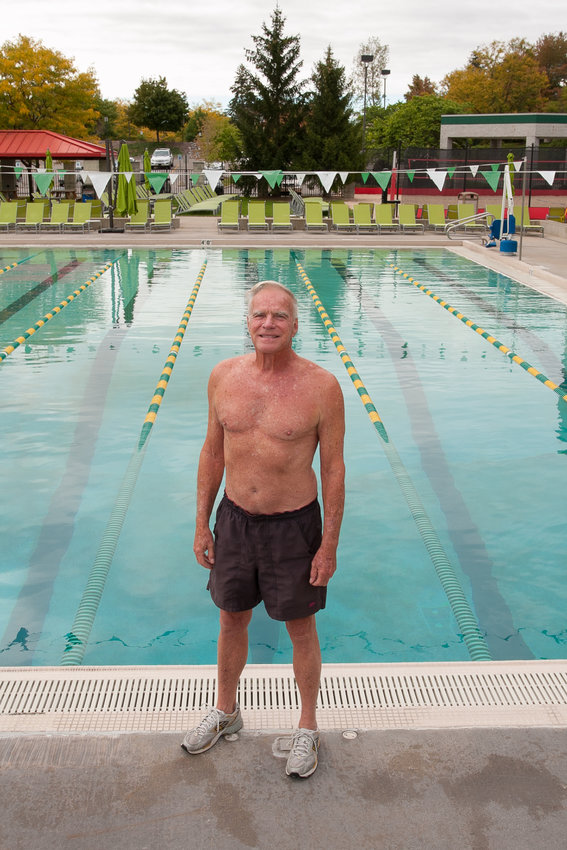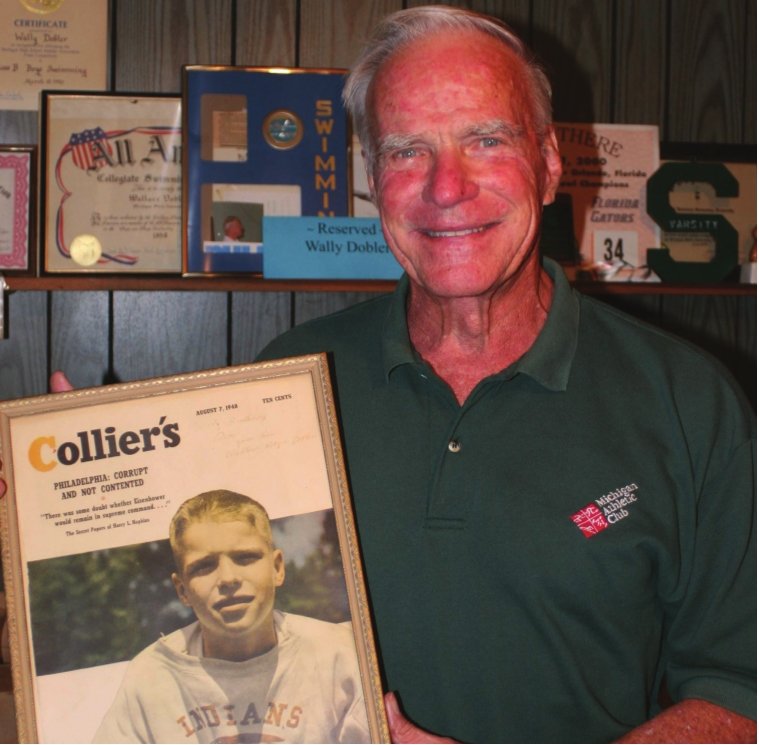
After 70 years of moving through water, Wally Dobler doesn’t walk across a roomful of air. He teleports. Air resistance means nothing to him.
Ramrod straight, ruddy-faced and hearty, the 82-year-old champion swimmer stood at the door of his Lansing home, saying hello. Two seconds later, he was in a chair, ready to talk. How did he do that?
For Dobler, getting older is exciting, because every decade gives him the chance to set more records in a new age group. He’s already set two world records, 13 national marks and dozens of state records. Dobler is living proof of the lifelong health benefit of swimming.
To list all his records and awards would put serious drag on this story, so wax up and let’s dive in at the shallow end.
Growing up in Flint, Dobler spent summers at nearby Camp Copneconic, where his dad was director. At a tender age, the younger Dobler was told he couldn’t swim to the raft until he could swim from dock to dock. He connected the dots right away. Water, he learned, was a medium for movement, a flying dream come true.
Every day at camp, the swim coach would line four boys up at one end of the 20-yard pool and tell them to race. It quickly got monotonous. He can still hear the voice carry over the water.
“Dobler, you won. Go back and race the next four. Dobler, you won. Go back and … ,” he barked, imitating the coach. “I don’t know, I just had a natural ability for swimming and I stuck with it.”
In 1946, at 13, he won a race on stilts against 100 other kids at Flint’s Ballenger Park.
“My dad built ‘em,” he said. “People walking around on stilts — it was just a fad, I guess.”
The prize was a baseball, handed to him by Charles S. Mott.
A well rounded athlete, Dobler has finished about 100 triathlons so far. But he isn’t crazy about the running part.
“Swimmers don’t like running, and runners don’t like swimming,” he said.
His first press coverage came not for athletics, but for sitting. At 14, he was fishing in a creek near Flint when a man spotted him and took his picture.
A few weeks later, he was walking down a street in Great Falls, Mo., on a visit to an aunt, when he spotted himself on the cover of Collier’s Magazine. He still has a copy of the magazine — and still flashes the same smile.
Back home, at Flint’s Central High School, Dobler placed sixth in the state in the individual medley. He kept on swimming after enlisting in the Army.
“I always liked adventure,” he said. “I jumped off of things as a kid. And then I went into the 82nd Airborne and I loved that. I won a lot of all-Army swimming competitions.”
Fresh out of the service, he qualified for the 1956 Olympic trials, which were held in Detroit, in the 200-meter butterfly. But he finished fourth. He wasn’t used to swimming in a long-course (50-yard) pool.
In 1957, a year after enrolling at MSU, Dobler became part of an old-ish, mostly married, veteran-heavy Spartan swimming team that managed to dart to a rare Big Ten championship.
Dobler married his wife, Ionne, in 1955. He coached swimming around the Midwest for several years, moved to Lansing in 1967 and settled into a landlocked job in pharmaceutical sales. His watery exploits resumed when he started swimming in master’s competitions — competitions for adult swimmers — in 1973. He placed in the top ten dozens of times. He had a banner year in 1994, at age 60, setting two world records in the 60-64 age group and placing first in the world in six other events.
For decades, Dobler’s trick has been to storm into each new age group full force, taking as many records as he can before he slows down.

Since he powered his way through 1994, he’s reached for a finer balance in life.
“You kind of think, ‘Been there, done that,’” he said. “How hard to I want to work to beat the best guys in the world?”
These days, he trains for quality, not quantity.
“I used to swim 400 yards freestyle and 200 back(stroke) up to 2,000 or 3,000 yards,” he said. “Now I’m down to 100 and 50. I feel I don’t need any more at my age, so I don’t do more.”
Last August, at the U.S. Masters championship in Geneva, Ohio, Dobler won the 50-yard breaststroke in his age division (80 and above), placed second in the 100-meter freestyle and third in the 200-meter freestyle.
The meet is in Spokane this year, but Dobler won’t be there.
“I’m not going that far to swim,” he said.
He spends a lot of time with his two children and five grandkids, coaches swimming at the Sparrow’s Michigan Athletic Club and referees swim meets.
In over 60 years of swimming, he hasn’t suffered any injuries — with one exception.
At a swim meet at Ohio State University in 1957, he stuck his arm out to do a flip turn, spun around to change direction,and his mighty arm and shoulder muscles clamped like a vise onto a wayward vein in his arm.
It took a few rounds of rehab to get everything untangled.
“Most swimmers do have pretty big shoulders. It just comes with the territory,” he said.
The key to avoiding such injuries, Dobler said, is to switch up your stroke so you don’t wear out your joints with repetitive motion.
At 82, Dobler retains a beyond-astronaut-level, interstellar glow of health. When he turned 75, he ran his first half marathon.
“Like any American male, I had my prostate out when I was 68. No side effects,” he said. “I have a cardiomyopathy. I just need to monitor it.”
In recent years, Dobler has gone mad over pickleball, which he calls “a crazy sport named after a dog.” The hybrid of tennis and ping pong is one of the fastest growing amateur sports in the country.
But chlorine blue is still his native habitat.
Theresa Sheridan, Aquatics Director at the Westside YMCA, knows all about Dobler, but she’s more interested in the benefits of swimming for your average dabbler.
She urges people to start swimming at an early age, like Dobler, so "you can benefit from it all your life." On the other hand, she said, it's never too late to start. Sheridan has seen many out-of-shape, arthritic, obese or simply despondent souls come to life after returning to the pool or starting swimming for the first time.
The best thing about swimming, she said, is that it’s less stressful on your joints than activities like running or biking.
“If you have any kind of arthritis or joint pain, you can still work out, get your heart rate up and build muscle, because it’s a resistance sport, because you’re buoyant,” Sheridan said.
Not all swimmers are as patient and even-tempered for lap swimming as Dobler. Sheridan echoed Dobler’s advice to change up the strokes, for both mental and physical reasons.
“If you break it up and do 10 hundreds (hundred-meters), five fast and five slow, before you know it, you’re done,” she said.
Interval training is less boring, less dangerous and it gets better results.
“If you only do the front crawl, you’re going to put wear and tear on your shoulders,” Sheridan said. “You should learn to do backstroke, breast stroke and front crawl. Variations of the kick will also help the joints.”
Swimming is unique among sports for several reasons. It can be profoundly relaxing and highly challenging for young and old, fit and unfit alike. It’s the only exercise this side of the thermosphere that gently lifts the burden of gravity. The water takes you wherever you want to go, whether your goal is to merely function better or grow massive pecs and morph into Aquaman.
“Who knows? You could end up like Wally,” Sheridan said. “He’s been swimming for a lot of years and he’s highly competitive. There’s nothing wrong with that.”
Support City Pulse - Donate Today!
Comments
No comments on this item Please log in to comment by clicking here